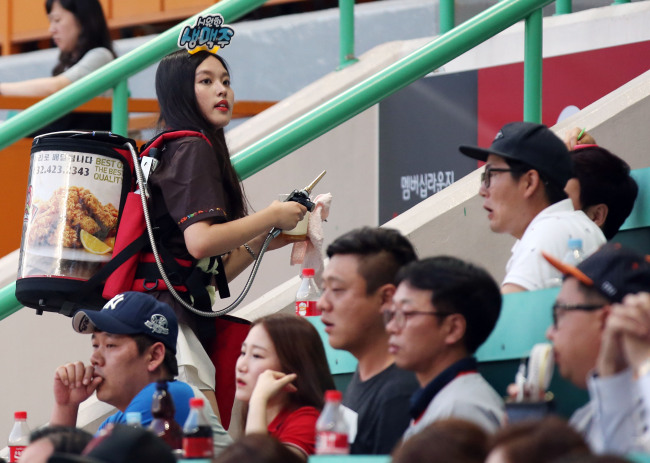South Korea’s Ministry of Environment and the Korea Baseball Organization joined hands Friday to restrict sales of beverages sold in disposable cups and increase awareness of recycling at baseball stadiums.
Under the new policy, beverages below 1 liter will only be sold in recyclable PET containers at all nine KBO stadiums by 2017.
Currently, there are six baseball stadiums in Korea -- Jamsil, Gocheok Dome, Suwon, Daegu, Masan and Daejeon -- that sell food and beverages in recyclable containers such as PET containers. The remaining three stadiums at Gwangju, Incheon and Busan Sajik will join the move starting next year, the KBO said.
The KBO amended its regulations last year, prohibiting sales of canned beverages and plastic bottles larger than 1 liter for safety reasons.
 |
A beer vendor sells beer in a disposable cup at Munhak Baseball Stadium in Incheon, Thursday. (Yonhap) |
The KBO strengthened regulations as it was worried the heavy containers could be thrown onto the field. But the ban in turn generated more waste, as kiosks sold canned beverages along with paper cups to be carried inside the stadium. Paper cups sold at the stands are not recyclable. The KBO estimated at least 4,000 such cups are thrown out after each game.
The ministry said that at least 2.9 million disposable cups from baseball stadiums are thrown away every year. Through the latest measure, the authorities expect the amount to be lowered by up to 30 percent.
“We expect this agreement to encourage citizens to participate in recycling and control their use of disposable items for our environment,” said Kim Dong-gu, an official covering recycling policy at the ministry.
Meanwhile, the National Tax Service said Thursday that it decided to allow one-man beer vendors -- better known as “beer boys“ here – to return to the baseball stadium stands.
After the discussion with the Ministry of Food and Drug Safety, the two authorities decided to revise the regulation and allow sales of snacks and food such as fried chicken delivery by the vendors.
The original regulation only permitted sales of alcoholic beverages at authorized locations. But the policy met strong opposition as soon as it was implemented in April.
The NTS explained such change in regulation was to “embrace the fact that our latest regulation did not recognize the general interest of Korean citizens.”
By Kim Da-sol (
ddd@heraldcorp.com)








![[Today’s K-pop] Blackpink’s Jennie, Lisa invited to Coachella as solo acts](http://res.heraldm.com/phpwas/restmb_idxmake.php?idx=644&simg=/content/image/2024/11/21/20241121050099_0.jpg)